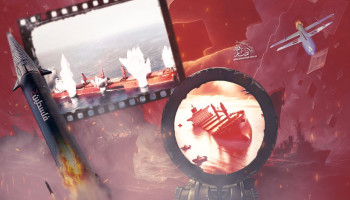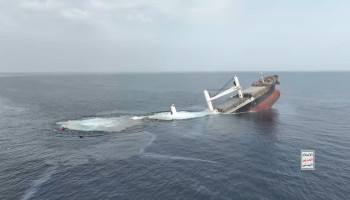Sana’a naval forces have issued a stern warning to the “Israeli enemy” about shocking surprises coming soon, affirming that the escalation of the naval blockade to its fourth phase will have severe repercussions not only on ships belonging to companies violating the blockade but also directly on the Israeli entity itself. This threat comes immediately after Yemeni forces declared that all ships affiliated with international shipping companies cooperating with Israel are now considered military targets.
A senior military source in Sana’a warned those companies yesterday of the grave consequences of continuing their dealings with the enemy. In an official statement published by the capital’s media, the source emphasized that “maritime navigation is safe for all except Israeli vessels, ships heading to occupied Palestinian ports, or vessels belonging to companies that violate the blockade decision—until the aggression and siege on Gaza end.” The source stressed the necessity for all passing ships to keep their communication identifiers open, highlighting that Sana’a naval forces are fully ready to receive distress calls and assist compliant ships through International Channel 16.
Meanwhile, Major General Mohammed Ali al-Qadiri, commander of Sana’a’s Coastal Defense Forces, threatened the Israeli enemy with major surprises during the fourth phase of escalation. In a statement carried by the military newspaper 26 September, al-Qadiri explained that Yemen’s support for Gaza has progressed steadily through stages to reach the highly prepared fourth phase. He called on “America and the Zionists to reconsider their calculations,” stressing that Yemeni forces “have succeeded in establishing a low-cost deterrence equation and managed to disrupt the U.S. Navy, forcing it to retreat from the Red Sea during previous rounds of conflict.”
Al-Qadiri also pointed out that his forces “possess multiple options to block the passage of any ship, regardless of its nationality or the owning or operating company’s ties to the Israeli entity.” He added that Sana’a’s forces “have tightened control over the Red Sea and imposed an effective blockade on maritime navigation linked to the occupation in support of Gaza.” He described recent developments in the Red Sea as “clear evidence of a fundamental shift in the regional balance of power.”
Lloyd’s List Warns Shipping Industry Not to Ignore Yemeni Threat as Sana’a Moves to Enforce It
The British maritime magazine Lloyd’s List warned yesterday of the serious repercussions Yemen’s recent decision could have on the global shipping market. It described the Yemeni threat as ushering in a “new phase of terror” for Red Sea navigation.
Martin Kelly, Head of Advisory at EOS Risk, was quoted confirming that “Sana’a forces are already in the process of enforcing this approach,” citing a previous attack on the oil tanker Magic Seas as proof of Sana’a’s resolve. Dirk Siebels, analyst at Risk Intelligence, urged ship operators to take the Yemeni threats with utmost seriousness, warning that ignoring them could lead to “massive losses.” He recalled the fate of the Magic Seas and Eternity C vessels, which were targeted and sunk after defying the blockade on Israel and disregarding Yemeni warnings.
Israeli Media Express Deep Concern Over Yemeni Escalation in Red Sea
Hebrew media outlets dedicated extensive coverage to the recent Yemeni escalation. The Hebrew website News Israel reflected the Israeli establishment’s deep concerns about the impact of Sana’a’s decision on shipping companies operating with Israel. The report described the Houthi naval escalation as “unprecedented,” warning it would “disrupt supply chains to and from Israeli ports” and negatively affect maritime tourism. It also suggested the threat could force companies to reconsider docking in Israel altogether.
The report confirmed that insurance costs for vessels near Israeli ports have skyrocketed to unprecedented levels due to Yemeni attacks, predicting that the latest escalation will cause “serious damage” including higher prices, significant delays, and difficulties in both importing and exporting goods.
By: Rashid Al-Haddad







